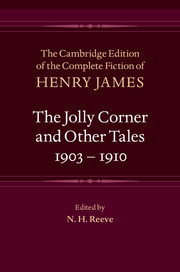Book contents
- Frontmatter
- Contents
- Acknowledgements
- List of Abbreviations
- General Editors’ Preface
- General Chronology of James’s Life and Writings
- Introduction
- Textual Introduction
- Chronology of Composition and Production
- Bibliography
- The Jolly Corner and Other Tales 1903–1910
- Glossary of Foreign Words and Phrases
- Notes
- Textual Variants
- Emendations
- Appendices
V
Published online by Cambridge University Press: 11 April 2021
- Frontmatter
- Contents
- Acknowledgements
- List of Abbreviations
- General Editors’ Preface
- General Chronology of James’s Life and Writings
- Introduction
- Textual Introduction
- Chronology of Composition and Production
- Bibliography
- The Jolly Corner and Other Tales 1903–1910
- Glossary of Foreign Words and Phrases
- Notes
- Textual Variants
- Emendations
- Appendices
Summary
Within the apartment to which he had been admitted, moreover, the fine intelligence we have imputed to him was in the course of three minutes confirmed; since it took him no longer than that to say to himself, facing his old acquaintance, that he had never seen any one so improved. The place, which had the semblance of a high studio light as well as a general air of other profusions and amplitudes, might have put him off a little by its several rather glaringly false accents, those of contemporary domestic “art” striking a little wild. The scene was smaller, but the rich confused complexion of the Pocahontas, showing through Du Barry paint and patches, might have set the example—which had been followed with the costliest candour—so that, clearly, Winch was in these days rich, as most people in New York seemed rich; as, in spite of Bob's depredations, Florence Ash was, as even Mrs. Folliott was in spite of Phil Bloodgood’s, as even Phil Bloodgood himself must have been for reasons too obvious; as in fine every one had a secret for being, or for feeling, or for looking, every one at least but Mark Monteith.
These facts were as nothing, however, in presence of his quick and strong impression that his pale, nervous, smiling, clean-shaven host had undergone since their last meeting some extraordinary process of refinement. He had been ill, unmistakably, and the effects of a plunge into plain clean living, where any fineness had remained, were often startling, sometimes almost charming. But independently of this, and for a much longer time, some principle of intelligence, some art of life, would discernibly have worked in him. Remembered from college years and from those two or three luckless and faithless ones of the Law School as constitutionally common, as consistently and thereby doubtless even rather powerfully coarse, clever only for uncouth and questionable things, he yet presented himself now as if he had suddenly and mysteriously been educated. There was a charm in his wide, “drawn,” convalescent smile, in the way his fine fingers—had he anything like fine fingers of old?
- Type
- Chapter
- Information
- The Jolly Corner and Other Tales, 1903–1910 , pp. 409 - 411Publisher: Cambridge University PressPrint publication year: 2017

